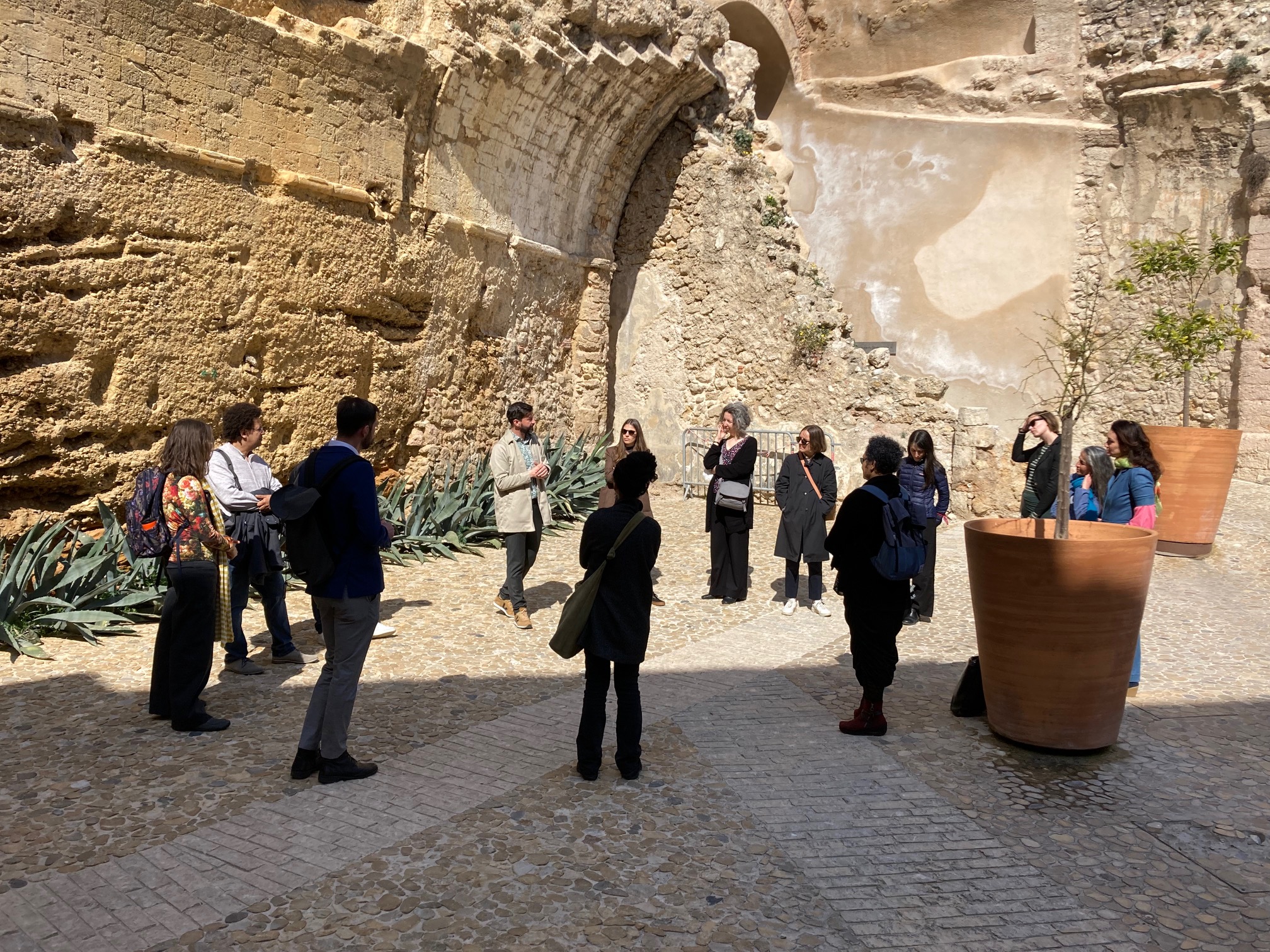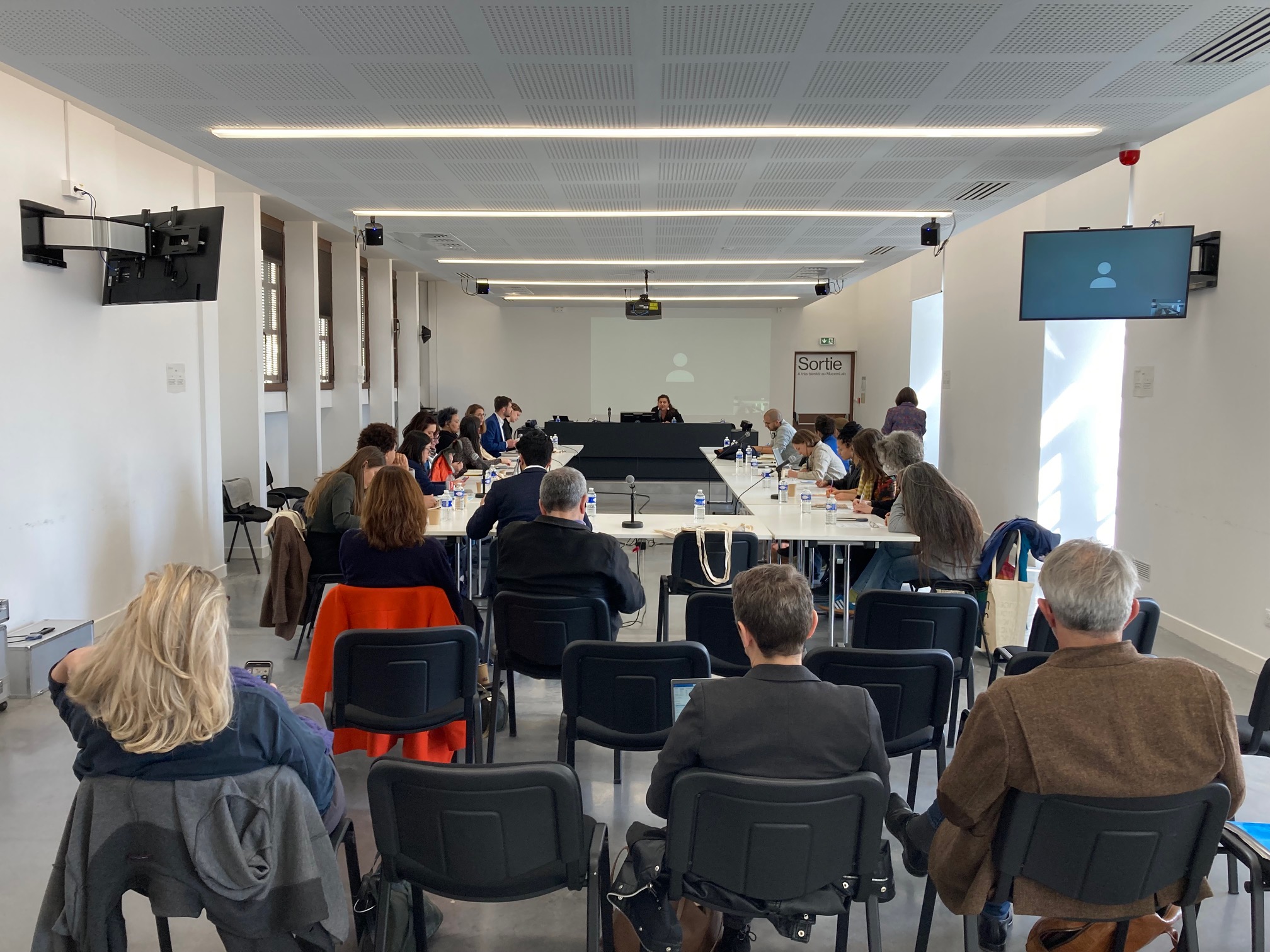As part of the project “Taking Care: Ethnographic and World Cultures Museums as Spaces of Care”, co-funded by the Creative Europe programme, the Museum of European and Mediterranean Civilisations (Mucem) organised a “Creative Study Lab”: a workshop or working group that brings together project partners and guests from other fields of expertise, including artists, curators and researchers. The Creative Study Lab was designed as a shared space for reflection around the themes discussed and working methodologies implemented in other TAKING CARE activities led by Mucem, such as the artist residency with French photographer Antoine d'Agata from March to December 2021, the experimental exhibition, “Psychodemia”, and the associated artist’s book. This meeting was an opportunity to highlight issues concerning the concept of “care” in a museum of society like Mucem, with illustrations also coming from other activities.
_klein.jpg)
In October 2021, an initial exchange was organised with the partner institutions: Weltmuseum, Africa Museum, MARKK Hamburg, Research Center for Material Culture, Pitt Rivers Museum, Cambridge Museum of Archaeology and Anthropology, and Slovene Ethnographic Museum. This online meeting was an opportunity to hear from partners about their expectations and work together to develop an outline for the meeting organised a few months later in Marseille: “Vulnerability of people, fragility of objects: collections, contemporary art and ethnography” (23 and 24 March 2022).
The purpose of these two study days was to address the theme of contemporary art as an artistic expression of vulnerability, collaborative experiences in the face of vulnerability through the relationship between donors, witnesses and museums, and issues around the preservation and reappropriation of knowledge and cultures that have been destroyed.
The first day was headed up by Sandra Laugier, CNRS research director, professor of contemporary philosophy at Paris Sorbonne University, and author of the artist’s book “Psychodemia”, which is the publication from the eponymous exhibition. Her fields are the ethics and aesthetics of the ordinary and the ethics of care.
The workshops were moderated by Aude Fanlo, Head of the Research and Teaching Department at Mucem, Scientific and Cultural Officer for the TAKING CARE project and curator of the “Psychodemia” exhibition, and Marion Slitine, art anthropologist, specialist in performing arts and cultural players in North Africa and the Near East, and post-doctoral researcher with the EHESS school of social sciences and Mucem.

The partners began with a visit to the Mucem Conservation and Resources Centre (CCR), the museum’s third site, located in the Belle de Mai district of Marseille. The partners and speakers were welcomed by Mikaël Mohamed, Head of International Relations at Mucem, and were then taken on a tour through the “model apartment” by Emilie Girard, Scientific and Collections Director. This is one of four spaces open to the public, along with the artefact consultation room, the reading room and the exhibition room. Together they create a unique place which offers a true showcase for the Mucem’s collections.
They were able to discover in situ the work “Here is my heart!”, presented by its creator, Syrian artist Khaled Dawwa and curator Helia Paukner, Head of the “Contemporary Art” section at the Mucem. This piece has been recently acquired by the museum and is a monumental model representing a fictitious neighbourhood strongly inspired by the Ghouta neighbourhood in Damascus, infamous for the sarin gas bombings in 2013 as a stronghold of the Free Syrian Army.
Also at the CCR, the partners enjoyed a guided tour of Antoine d'Agata’s exhibition “Pyschodemia” with Aude Fanlo. The exhibition “Psychodemia” (Psychodémie) is a reflection on the effects of the Covid-19 pandemic and the first lockdown on our bodies, imaginations and societies. Beyond the unprecedented dimension of this health and social crisis, the exhibition seeks to understand and define how this forced isolation has impacted us, using the open term, “psychodemia”.
At the end of the first morning, the partners gathered for the first workshop: “Tinkering with the irreparable: fragile lives, delicate materials, patient work.”
This included Guillaume Desanges, President of the Palais de Tokyo, art critic and curator of the “Matters of Concern/Matières à panser” exhibition cycle, Hélia Paukner, Mucem curator, Nora Philippe, creator and curator of the exhibition “Repair and Stitches” (Répare, reprise) and Majd Abdel Hamid, a Syrian artist presented in these exhibitions.

The speakers were invited to talk about artistic creations in which material fragility, patience and meticulous work arise from private and political resilience and resistance in the face of destruction.
The second workshop “Repairing, Recognising, Rediscovering” was held on the morning of 24 March. Anna Guillo, artist and professor in visual arts and art sciences at the University of Aix-Marseille, presented the “antiAtlas of Epistemicide”. This research and art programme has been developed as a scientific and artistic directory of destroyed, confiscated and hidden knowledge.
In response, Samir Boumediene, a historian responsible for research at the CNRS-ENS Lyon and author of La Colonisation du savoir, Une histoire des plantes médicinales du “Nouveau Monde” (2017), currently based at Villa Medici, was invited to speak on the topic of discovery in cultural, social and political art history.
Between the day’s first and second workshops, speakers and guests were taken on a tour of two integral parts of Mucem: Fort Saint Jean, a former military complex that has become a new vibrant hub in Marseille since the museum’s opening, and the J4, a contemporary building designed by architect Rudy Rucciotti. The tour concluded with a visit to the collaborative exhibition “HIV/AIDS: the epidemic isn’t over!”, led by exhibition curator and research and collection manager, Caroline Chenu.
The day ended with the third and final workshop in this Creative Study Lab: “Preserving and observing missing objects, raw testimonials”.
Continuing on from the exhibitions “Psychodemia” and “HIV/AIDS: The epidemic isn’t over!”, which are based on testimonials collected by the museum, this workshop addressed the relationships between collectors and donors, and ways of giving these relationships form through objects and mediating narratives.
Discussion was fuelled by successive interventions from three duos: Fabrice Denise, Director of the Marseille Museum of History, on the collapse of the Noailles apartment blocks, a tragedy that occurred in November 2018 and cost the lives of 8 people, and Laura Spica, President of the Noailles Debout! collective on the project “Street of Museums/Museum of the Street - take your place, Acte I”. This was followed by the artists gethan&myles, on their work with stainless metal “Lazare / The Space Between How Things Are And How We Want Them To Be”, made using a collection from charity pawnbrokers. Then came artist Dalila Mahdjoub on his work “Roman national Enchanteur” (Enchanting national story), born out of a teaching project with a class of 13/14 year-olds as part of the Algeria-France curriculum, and Camille Faucourt, curator of the “Mobility & cross-influences” section at Mucem.